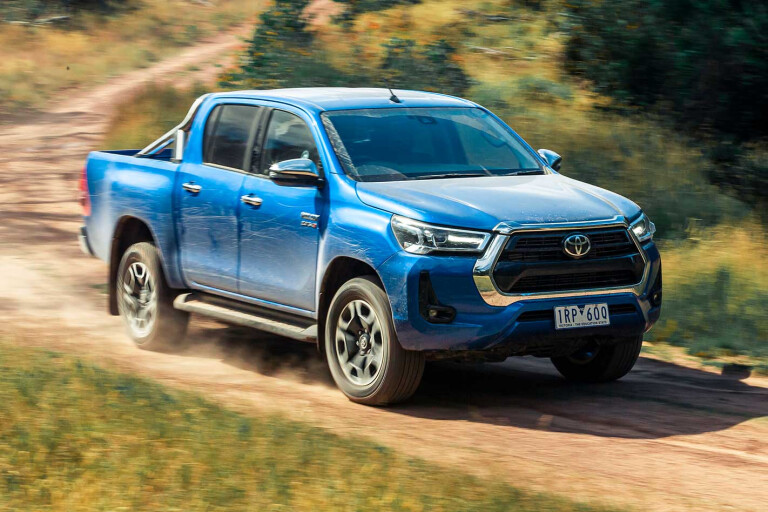
THE eighth-generation Toyota Hilux has been around for five years now and, after the first facelift came in 2017, this second one arrived in September 2020.
4X4OTY CONTENDERS
2021 ISUZU D-MAX
MAZDA BT-50 XTR
JEEP GLADIATOR RUBICON
LAND ROVER DEFENDER
More than just a facelift though, the update came with significant changes to the 1GR engine to improve output and performance.
For 4x4OTY we have an SR5+ on the test. This starts at $59,920 for Double Cab Pickup SR5 Automatic, but add $600 for premium paint and another $2500 for the premium (leather seats) interior and we’re up to $63,020 (plus ORC).
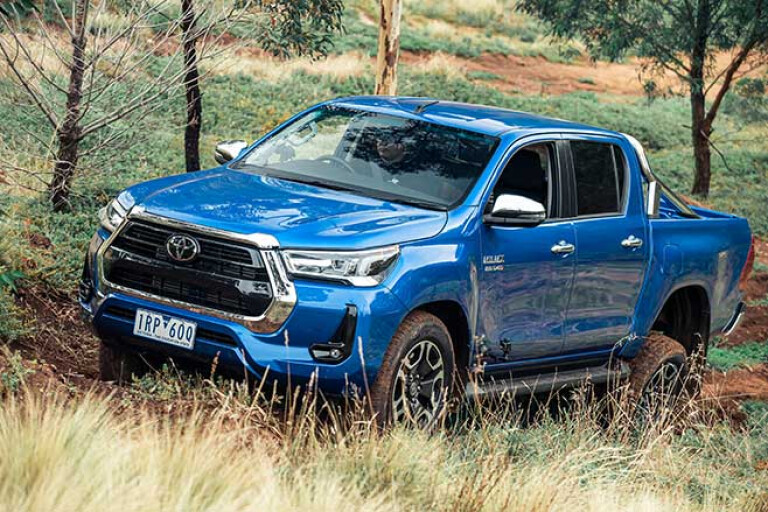
POWERTRAIN & PERFORMANCE
TOYOTA replaced its 3.0-litre four-cylinder 1KZ series of diesel engines with the all-new 2.8-litre four-pot 1GR series with the introduction of the eighth-gen back in 2005, and it disappointed drivers with lacklustre performance and frustrated them with an ongoing series of problems around the diesel particulate filter (DPF) which is part of the mandated emissions control system.
The fact that Toyota claims to have fixed the DPF issues in Hilux and other diesel-fuelled Toyota vehicles is something we can’t substantiate in our testing, except to say we had no problems with it. What we can say is the upgrades to the 1GR-FTV engine have made a world of difference to it, bringing life to what was the most mundane of powerplants.
WINNER: How the Hilux won 4X4OTY
The 2020 changes includes a new cylinder head, turbocharger and higher pressure fuel-injection system among other new components. These changes improve the power and torque from a best of 130kW and 450Nm (pre-September 2020) to 150kW and 500Nm with the updates. The 500Nm of torque is up there with the best four-cylinder engines in its class, and you can really feel the changes in the Hilux.
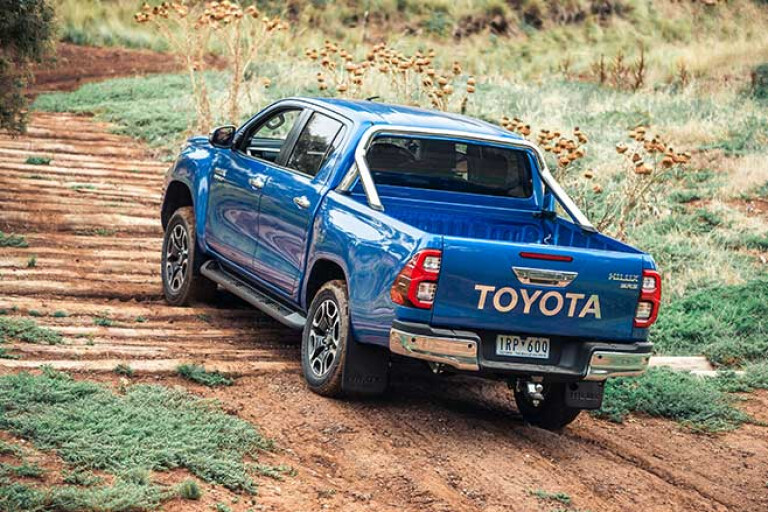
ON-ROAD RIDE & HANDLING
The upgrades to the 2.8 engine are well-appreciated on road where the noticeable extra pick-up in the middle of the rev range makes overtaking and powering through corners both easier and more comfortable. It brings performance where there was nothing before and is chalk and cheese over the previous engine.
4X4OTY ROUTE: Vic High Country and beyond
But it’s not all about grunt. Revisions to the suspension see the rear leaf springs lengthened to make them more compliant and mounted farther outboard on the chassis to improve stability. The longer springs have softened what was widely regarded as too stiff a ride – not a lot, but definable – and their placement makes the chassis feel more planted on mountain roads and gravel corners.
OFF-ROAD
THOSE longer rear leaf springs work just as well off-road, improving the Hilux’s already impressive (by OE standards) rear-axle travel. This lets the rear wheels walk in and out of ruts and holes in the track to maintain tyre contact and hence traction.
The front end impresses with its compliance as well, yet it was still firm enough to keep the skid plates from grounding out on the long, steep descent down the Billy Goat Bluff Track. That’s pretty good for an OE IFS ute.
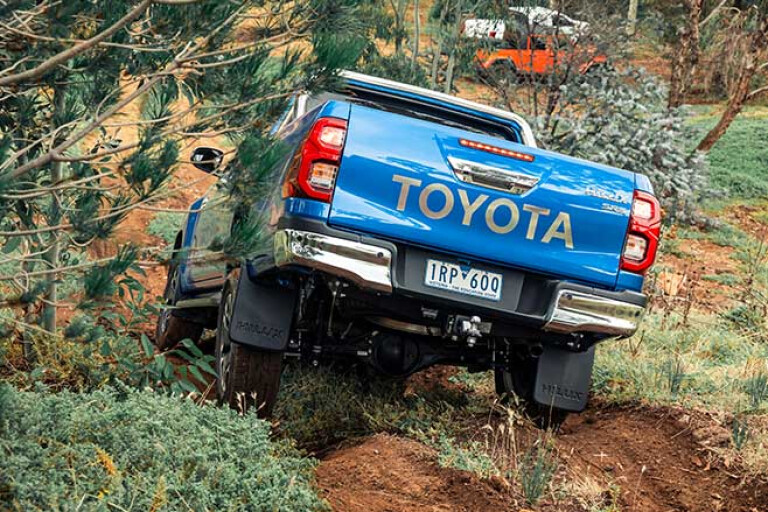
Combine this with the Lux’s excellent ETC calibration and this SR5 walked smoothly up our set-piece hill climb. As we’ve found on this hill in past experience, the Hilux climbs better using just the ETC than when engaging the RDL. With the RDL in the ETC is fully cancelled, making your front axle basically a single-spinner; and as soon as you lift a front wheel, you’re going nowhere. There might be other off-road situations where the RDL would be more beneficial than the ETC on the Hilux, but we haven’t found them yet.
CABIN & ACCOMMODATION
THE Hilux cabin has always been a comfortable place to ride, but it was let down by a few niggles with some components. It sounds like Toyota listened to the complaints and addressed them with the 2020 upgrades.
The AV screen is a new eight-inch unit that integrates better into the dash. It has an excellent factory sat-nav system that shows more High Country tracks than Google Maps does, but the system also includes Apple CarPlay and Android Auto if you prefer Google. Best of all, Toyota has fitted a nice, big volume dial to the unit – so full marks there.
The leather seats are a nice upgrade as part of the optional premium interior package, while the new gauge binnacle is clear and easy to read and scroll through the information menus.
The Hilux does fall short of some newer utes in the class in terms of safety kit. It still has ABS, ETC, ESC, AEB and a lane-departure system that uses the brakes to prevent wandering rather than the steering as most vehicles do. This makes this system less intrusive for the driver and is due to the Hilux retaining hydraulic power steering assistance in lieu of electric. The valuable rear cross-traffic alert is not offered on Hilux.
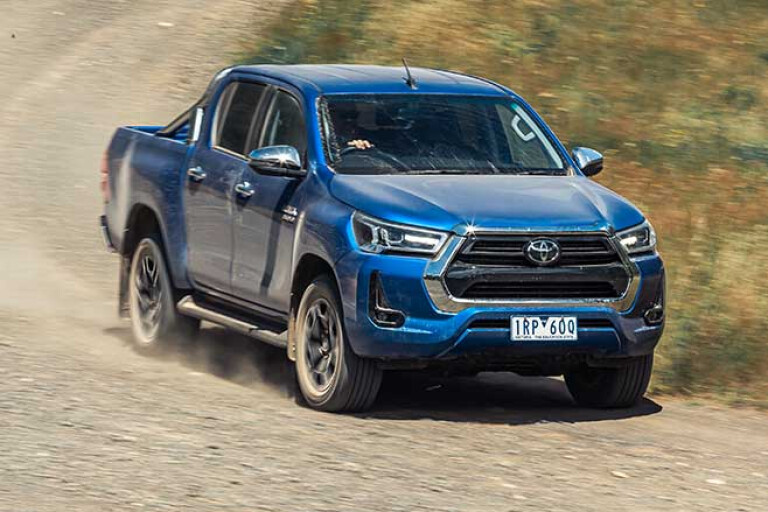
PRACTICALITIES
IN SR5+ spec the Hilux has an 1105kg payload and 3500kg towing capacity. It has a 700mm wading depth and good air-intake placement inside the fender. Toyota offers heaps of factory-backed accessories and, being the best selling car in Australia, it is massively supported by the aftermarket off-road gear businesses The OE tyre size is a 265/60-18, although you could fit 17s as on the lower grades.
SPECS
ENGINE: 2.8-litre 4-cyl turbo diesel
MAX POWER: 150kW at 3400rpm
MAX TORQUE: 500Nm from 1600 to 2800rpm
TRANSMISSION: 6-speed automatic
TRANSFER CASE: Part-time 4x4 w/ high/low range
STEERING: Hydraulic-assist rack and pinion
FRONT SUSPENSION: IFS w/ upper and lower control arms, coil springs
REAR SUSPENSION: Live axle, leaf springs, stabiliser bar
TYRES: 265/60-R18
KERB WEIGHT: 2093kg
PAYLOAD: 1105kg (cab-chassis)
TOWING CAPACITY: 3500kg
GVM: 3050kg
GCM: 5850kg
FUEL TANK CAPACITY: 80L
ADR FUEL USE: 7.9L/100km
TEST FUEL USE: 12.96L/100km
APPROACH ANGLE 29°
RAMPOVER ANGLE n/a
DEPARTURE ANGLE 27°
WADING DEPTH 700mm
GROUND CLEARANCE 216mm

COMMENTS